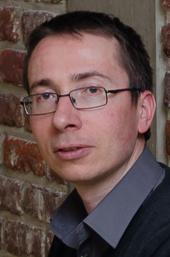Keynotes
We are pleased to announce this year's joint EDBT/ICDT keynote speakers:
Benchmarking Graph Data Management Systems
Peter Boncz
VU University Amsterdam
Video: http://helios-eie.ekt.gr/EIE/handle/10442/13868

Many so-called "Big Data" data management problems revolve around analysis of heterogeneous, and complexly structured data sets where the data is interrelated, thus forming a graph that connects billions of nodes. Here, the worth of the data and its analysis is not only in the attribute values of these nodes, but in the way these nodes are connected. Specific application areas that exhibit the growing need for management of such graph-shaped data include life science analytics, social network marketing and digital forensics. In this keynote, I will make the case that in order to evaluate pros and cons of using new emerging technology such as graph database systems or distributed graph programming frameworks, as well as more established technology such as MapReduce or even traditional (parallel) database systems, it is important to develop a new generation of benchmarks. In this context I will describe some of the work being conducted in the LDBC (Linked Data Benchmark Council - ldbc.eu), focusing on so-called "choke point" based benchmark development.
Bio: Peter Boncz holds appointments as tenured researcher at CWI and full professor at VU University Amsterdam. His academic background is in core database architecture, and his work focuses on the interaction between computer architecture and data management techniques. His specific contributions are in cache-conscious join methods, query processing in columnar database systems (specifically MonetDB), and vectorized query execution (Vectorwise). He received the Dutch ICT Regie Award 2006 for his role in the CWI spin-off company Data Distilleries. In 2008 he founded the CWI spin-off company around Vectorwise. He is also the co-recipient of the 2009 VLDB 10 Years Best Paper Award, and in 2013 received the Humboldt Research Award. Peter Boncz currently is the scientific director of the EU project LDBC, that aims to establish industry-strength graph and RDF benchmarks and benchmark practices.
Knowledge out there on the Web
Serge Abiteboul
Institut National de Recherche en Informatique et en Automatique & Ecole Normale Supérieure de Cachan
Video: http://helios-eie.ekt.gr/EIE/handle/10442/14371

The Web is turning from a collection of documents to a word of systems exchanging interlinked knowledge. This is radically changing the user's perspective who can now actively participate both in person or via systems (phones, cars, home applicances, etc.) We will survey different ways of acquiring knowledge on the Web. We will mention recent works on distributed knowledge management that addressed issues such as inconsistencies or privacy. We will also discuss novel technical challenges that arise.
Bio: Serge Abiteboul obtained his Ph.D. from the University of Southern California, and a Doctoral Thesis from the University of Paris-Sud. He became a researcher at the Institut National de Recherche en Informatique et Automatique in 1982. He was a Lecturer at the École Polytechnique and Visiting Professor at Stanford and Oxford University. He has been Chaire Professor at Collège de France in 2011-12 and Francqui Chair Professor at Namur University in 2012-2013. He co-founded the company Xyleme in 2000. Serge Abiteboul has received the ACM SIGMOD Innovation Award in 1998, the EADS Award from the French Academy of sciences in 2007 and the Milner Award from the Royal Society in 2013. He became a member of the French Academy of Sciences in 2008, and a member the Academy of Europe in 2011. He is currently PI of the Webdam ERC (2008-2013) and a member of the LSV at the École Normale Supérieure, Cachan. His research work focuses mainly on data, information and knowledge management, particularly on the Web. He is a member of the Conseil national du numérique and Chairman of the Scientific board of the Société d'Informatique de France.
Remaining CALM in declarative networking
Frank Neven
Database and theoretical computer science research group, Hasselt University
http://alpha.uhasselt.be/frank.neven
Video: http://helios-eie.ekt.gr/EIE/handle/10442/14370

Declarative networking is an approach where distributed computations and networking protocols are modeled and programmed using formalisms based on Datalog. In his keynote speech at PODS 2010, Hellerstein made a number of intriguing conjectures concerning the expressiveness of declarative networking. One of those became popular under the name of the CALM conjecture (Consistency And Logical Monotonicity) and suggests a strong link between, on the one hand, eventually consistent and coordination-free distributed computations, and on the other hand, expressibility in monotonic Datalog. In this keynote, I will discuss recent results concerning the CALM conjecture and will point out future directions and challenges for the community.
Bio: Frank Neven is a full professor at Hasselt University. His main research area is that of database theory and systems. Recent research interests include datamining in bioinformatics, automatic schema inference, big data, cloud computing, and logic in databases. A significant part of his research has been devoted to applying automata theoretic techniques to the analysis of XML processing.
The Relational Join: New Theory and New Applications
Christopher Ré
Department of Computer Science, Stanford University
http://cs.stanford.edu/people/chrismre/
Video: http://helios-eie.ekt.gr/EIE/handle/10442/14375

Bio: Christopher (Chris) Re is an assistant professor in the Department of Computer Science at Stanford University. The goal of his work is to enable users and developers to build applications that more deeply understand and exploit data. Chris received his PhD from the University of Washington in Seattle under the supervision of Dan Suciu. For his PhD work in probabilistic data management, Chris received the SIGMOD 2010 Jim Gray Dissertation Award. Chris's papers have received four best-paper or best-of-conference citations, including best paper in PODS 2012, best-of-conference in PODS 2010 twice, and one best-of-conference in ICDE 2009. Chris received an NSF CAREER Award in 2011 and an Alfred P. Sloan fellowship in 2013.













